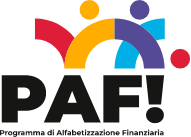



Project
In our cities, quality of life is closely tied to the economic and cultural opportunities available. However, many people with a migratory background encounter difficulties in accessing basic financial services, often due to language barriers, legal status limitations, and at times a lack of financial education.

These obstacles undermine the full integration and participation of the entire foreign population in the country’s economy, even though recent studies show that migrant workers contribute 8.8% to the national GDP, with peaks of 16.4% in agriculture and 15.1% in construction.
PAF! (Programma di Alfabetizzazione Finanziaria) was created with the goal of improving the financial skills of citizens from Third Countries. The project’s name evokes the sound of a handshake, a universal symbol of agreement and collaboration. This gesture represents the willingness to build bridges between different cultures, promoting social inclusion and fair access to financial services.
The PAF! Project is active in four regions: Lombardia, Lazio, Campania, and Sicilia; In doing so, it establishes a privileged laboratory for observation and intervention, implementing the planned actions in different ecosystems from north to south and focusing on those regions where the presence of citizens with a migratory background is greatest.









